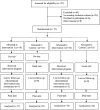Impact of Watson's human caring-based health promotion program on caregivers of individuals with schizophrenia
- PMID: 37386572
- PMCID: PMC10311737
- DOI: 10.1186/s12913-023-09725-9
Impact of Watson's human caring-based health promotion program on caregivers of individuals with schizophrenia
Erratum in
-
Correction: Impact of Watson's human caring-based health promotion program on caregivers of individuals with schizophrenia.BMC Health Serv Res. 2023 Jul 13;23(1):748. doi: 10.1186/s12913-023-09800-1. BMC Health Serv Res. 2023. PMID: 37442978 Free PMC article. No abstract available.
Abstract
Background: Caring for people with schizophrenia is accompanied by challenges that impact caregiver health. We conducted this study to explore the effect of a Caring Science-Based health promotion program on the sense of coherence and well-being among caregivers of persons with schizophrenia.
Methods: This randomized clinical trial with the Solomon four-group design was conducted on 72 caregivers randomly allocated into two intervention and two control groups. A health promotion program based on Watson's theory was performed individually through five face-to-face sessions and a four-week follow-up. Settings were the psychiatric centers of the three educational, specialty, and subspecialty Ibn-e-Sina, Moharary, and Hafez hospitals affiliated with Shiraz University of Medical Sciences (SUMS), south of Iran. The data were collected using a demographic information form, the Sense of Coherence Scale, and the Caregiver Well-Being Scale. One-way ANOVA, chi-square, Kruskal-Wallis, and independent t-test were used to determine the homogeneity at baseline. In the post-test, multiple between-groups and pairwise comparisons were assessed by One-way ANOVA and Tukey's post-hoc. Within-group comparisons were evaluated using paired t-tests. All tests were two-tailed, and the statistical level was considered 0.05.
Results: Data analysis showed that the mean scores of caregiver sense of coherence and well-being from pre-intervention to post-intervention were significantly increased in the intervention groups (p < 0.001). At the same time, there were no significant differences in the control groups.
Conclusion: The health promotion program based on Watson's human caring theory facilitated ongoing intrapersonal, and holistic caring and improved the sense of coherence and well-being in caregivers of persons with schizophrenia. Hence, this intervention is recommended for developing healing care programs.
Trial registration: https://www.irct.ir/trial/55040 : IRCT20111105008011N2 (11/04/2021).
Keywords: Caregivers; Health promotion; Schizophrenia; Sense of coherence; Watson’s Human Caring Theory; Well-being.
© 2023. The Author(s).
Conflict of interest statement
The authors declare they have no competing interests.
References
-
- Haghgoo A, Zoladl M, Afroughi S, Rahimian H, Mirzaee MS. Assessment of the Burden on Family Caregivers of Patients with Mental Disorders Hospitalized in Shahid Rajai Hospital in Yasuj, 2016. Assessment. 2017;5(2). 10.21859/ijpn-05026.
-
- Koolaee AK. Models and methods of clinical research: mental health of older caregivers of schizophrenia patients in Iran. Middle East J Age Ageing. 2010;83(2252):1–8.
-
- Malakouti SK, Nouri ghasemabadi R, Naghaviravandi M, Ahmadi abhari S, Nasr esfahani M, Afgheh S, et al. The burden of caregivers of chronic mental patients and their needs to care and therapeutic services. Hakim Res J. 2003;6(2):1–10.
Publication types
MeSH terms
Grants and funding
LinkOut - more resources
Full Text Sources
Medical


